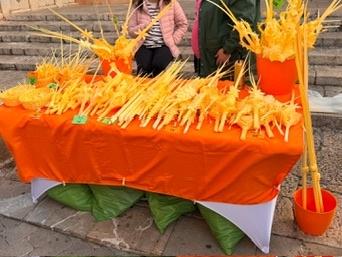How do Mallorcan women incorporate local flora into their handmade soaps and cosmetics?
Similar Topics
mallorcan handmade soaps
local flora skincare
mediterranean herbs cosmetics
lavender soap benefits
sustainable beauty mallorca
natural olive oil
traditional mallorcan artisans
balearic islands botanicals
Mallorcan women have a longstanding tradition of incorporating the island’s rich local flora into their handmade soaps and cosmetics, a practice that reflects both the natural abundance and cultural heritage of the Balearic Islands. The Mediterranean climate of Mallorca allows for a variety of aromatic herbs, flowers, and plants to flourish, such as lavender, rosemary, thyme, and rose geranium. These botanicals are often foraged or cultivated in home gardens, ensuring that the ingredients used are fresh, sustainable, and intimately connected to the island’s landscape.
The process typically begins with the delicate harvesting of flowers and herbs at their peak, capturing the essence and potency of each plant. These are then infused into oils or added directly into soap mixtures, allowing their natural fragrances and beneficial properties to permeate the final product. Lavender, for example, is prized not only for its soothing, calming scent but also for its antiseptic qualities, making it a staple in bath and body products. Similarly, rosemary and thyme contribute invigorating aromas and antioxidants, enhancing the soaps’ cleansing and skin-nourishing effects.
Many Mallorcan artisans also embrace traditional methods passed down through generations, blending local flora with organic, natural bases such as olive oil, which itself is abundant in the region. This combination results in products that are gentle on the skin, environmentally friendly, and rich in both cultural and botanical heritage. By focusing on locally sourced flora, these women not only honor the land but also promote a sense of place that appeals to both residents and visitors seeking authentic, nature-inspired skincare.
Ultimately, the handmade soaps and cosmetics crafted by Mallorcan women offer more than just cleansing and beautifying benefits; they provide a sensory connection to Mallorca’s natural environment. Each product tells a story of the island’s flora, climate, and artisanal skills, inviting users to experience a piece of Mallorca’s serene countryside in their daily self-care routines. This thoughtful incorporation of local plants underscores a broader commitment to sustainability and respect for the environment, hallmarks of Mallorcan craftsmanship.
The process typically begins with the delicate harvesting of flowers and herbs at their peak, capturing the essence and potency of each plant. These are then infused into oils or added directly into soap mixtures, allowing their natural fragrances and beneficial properties to permeate the final product. Lavender, for example, is prized not only for its soothing, calming scent but also for its antiseptic qualities, making it a staple in bath and body products. Similarly, rosemary and thyme contribute invigorating aromas and antioxidants, enhancing the soaps’ cleansing and skin-nourishing effects.
Many Mallorcan artisans also embrace traditional methods passed down through generations, blending local flora with organic, natural bases such as olive oil, which itself is abundant in the region. This combination results in products that are gentle on the skin, environmentally friendly, and rich in both cultural and botanical heritage. By focusing on locally sourced flora, these women not only honor the land but also promote a sense of place that appeals to both residents and visitors seeking authentic, nature-inspired skincare.
Ultimately, the handmade soaps and cosmetics crafted by Mallorcan women offer more than just cleansing and beautifying benefits; they provide a sensory connection to Mallorca’s natural environment. Each product tells a story of the island’s flora, climate, and artisanal skills, inviting users to experience a piece of Mallorca’s serene countryside in their daily self-care routines. This thoughtful incorporation of local plants underscores a broader commitment to sustainability and respect for the environment, hallmarks of Mallorcan craftsmanship.
🧩 Related Questions
Related Question
What is the best time of year to visit the beaches of Sa Colonia de Sant Jordi for water activities?
Related Question
What should travelers do if their reservation details for Mallorca accommodations seem incorrect?
Related Question
How do variations in rainfall affect the quality and yield of grapes used in Mallorca's winemaking industry?
